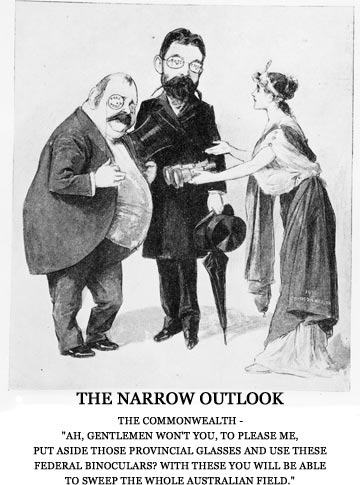The election campaign
When the Duke of Cornwall and York opens Parliament, Mr Barton will probably find nearly fifty members sitting behind him or inclined to give him a fair trial.
Alfred Deakin, April 1901
 |
|
The Narrow Outlook
Punch (Melbourne) 14 March 1901
National Library of Australia |
Before federation, the colonies raised most of their revenue from tariffs, or duties imposed on imports, from other Australian colonies as well as from overseas. Under the Constitution, trade between the states became absolutely free, and the federal Parliament was given exclusive power to impose tariffs.
The biggest single issue which divided candidates seeking election to the first federal Parliament was their attitudes to the level of tariffs to be applied to imported goods. Candidates were identified in the press as ‘Protectionist’, meaning that they supported a high tariff, or ‘Freetrade’, meaning that they advocated low tariffs. A third major group were the Labor candidates, who had a platform of broad social reform but were divided on the tariff issue.
While this division was much emphasised by the newspapers, in practice the tariff was an issue on which many were prepared to compromise.
Many candidates felt that this question was less important than the need to establish a national government, and pledged their support to Prime Minister Barton regardless of political philosophy. Nor did the tariff dominate the interest of the voters, many of whom voted on the basis of personal knowledge of the candidates.
The result of the coming Commonwealth elections will depend on whether our [Sydney] Morning Herald the Daily Telegraph, and the Evening News can secure a larger majority for Free Trade in this state [N.S.W.] than the Age, the Advertiser, and the Bulletin can whip up for protection in Victoria, South Australia and the country districts of New South Wales … the Press will be mainly responsible for the start we are making in our new national life and probably for the path we pursue in the future.
Alfred Deakin, February 1901
Northern Melbourne election—polling day at Fitzroy, March 29 1901
Pencil and crayon drawing
National Library of Australia
This drawing promotes the candidacy of Henry Bournes Higgins for the federal seat of Northern Melbourne in the first federal election, March 1901.
|


